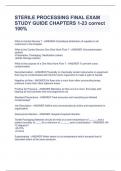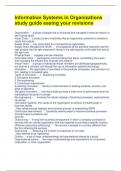Obligations & contract law notes
Podcast week 1
Structure of the course: the life of a contract
Formation performance remedies for a breach of contract
What is a contract?
- An agreement (or a promise) which is legally enforceable. (if you go to court, you can
enforce the promise that another party made).
- ‘Contract society’
- The division of labour – Adam Smith (1723-1790)
Contract law as part of private law
- Private law:
o Rules and principles applying to private actors such as individuals and
companies;
o For instance: contract law, tort law, restitution, property law, inheritance law,
family law, company law
- The law of obligations – contract law, tort law, restitution
o Obligation = an enforceable duty of one person vis-à-vis another person(s)
Contract as a part of private law – example
- Contract: terms, incl. price
- Property: transfer of ownership
- Tort: obligations arising from unlawful events (e.g. if you ride into someone with
your bike)
Where can contract law be found?
- National law
o Mandatory rules: rules that contracting parties cannot contract out of
o Default rules: everything else
- Eu law – consumer law
- Supranational law – for instance the CISG
- Informal rules – PECL, DCFR, PICC
Other sources of contract law
- Case law
- Custom
- Scholarship
- Sources have different weight in common law vs. civil law tradition
- Codification vs. development through case law
,What is a contract?
- An agreement (or a promise) which is legally enforceable.
- Contract as juridical act
o Friedrich Carl von Savigny (1779-1861)
o A juridical act = an act that have legal consequences because of the fact that
these consequences are intended by the person acting
o Contract; the making of a will (testament); the decision to establish a
company; the decision to quit a job; the decision to recognize a child.
- Parties to the contract
o Promisor/promisee
o Debtor/creditor
o Schuldner/Glaubiger
Classification of contracts
- Type of parties:
o B2B (business to business)
o B2C (business to consumer)
o C2C (consumer to consumer)
- Type of performance = what the parties need to do under the contract
o Nominate contracts/specific contracts
o Innominate contracts
- Reason for performance
o Bilateral contracts (sale of goods)
o Unilateral contracts (where one party gifts something, and the other party
accepts that gift)
The principles of contract law
- Freedom of contract
o Freedom to contract at all
o Choice of contents (on what terms you want the contract)
o Freedom to choose the other party
- The principle of the binding force of a contract (pacta sunt servanda)
- The principle of informality (compare: Roman law) (even an oral contract is binding)
- The principal of contractual fairness
o Substantive fairness = is there a fair bargain between two parties
o Procedural fairness = whether the contract came being in a fair manner
The doctrine of privity (relativity)
- A contract cannot confer rights or impose obligations upon any person who is not a
party to the contract.
- Art. 1199 FCC – ‘A contract creates obligations only as between the parties. Third
parties may neither claim performance of the contract nor be constrained to
perform it, subject to the provisions of this section…’
- Roman law – alteri nemo stipulari potest; no one could validly contract for the
benefit of another person who had not been party to the original contract.
, - XIX. Century – the enormous growth of the insurance market (particularly life
insurance)
Third parties and contract law
- Two situations
o Contracts for the benefit of third parties
o Contract confers a right on a third party
Contracts for the benefit of a third party
- Civil law
o Art. 1205 FCC
o §328(1) BGB
- Common law – England
o Two problems:
The doctrine of privity: only parties to the contract can benefit
The doctrine of consideration (it must be the promisee who provides
consideration for a promise that he wants to enforce).
o Contracts (Rights of Third Parties) Act 1999
Section 11 of the Married Women’s Property Act 1882
A husband or wife and/or their children may sue the insurance company ln a life insurance
policy made for their benefit by a spouse or parent; similar exceptions in case of marine and
fire insurance policies.
Formation – the intention to create legal relations
- The parties must intent to be legally bound
- The parties must reach a sufficient agreement (consensus ad idem/meeting of minds)
Meeting of minds
The parties when they contract must have an idea of what agreement they enter into and
that idea must be the same.
Dissensus
- The subjective approach – refers to the party’s subjective intention, regardless of
appearances
- The objective approach – refers to how a reasonable person would interpret a
party’s intention from his or her conduct in all the circumstances.
Mistake: e.g. a shop advertises an iMac for 6 euro
The basis of contractual liability
- The will theory: focusses on the subjective will of a party.
- The expression theory: focuses of the objective declarations of a party to determine
whether a contract comes into being.
- The reliance theory: subjectivity is a problem because you cannot read someone’s
mind and objectivity is a problem because it only relies on what is said and done and
what if someone makes a mistake (by accident stating that the price is 6 euro).
, - In principle, there needs to be a meeting of the minds between the parties. But if
there was no consensus then the reasonable reliance of the other party is still
protected.
no contract if dissensus, but the reasonable reliance of the other party is protected.
Smith v. Hughes
- Before concluding the contract, the farmer gave him a sample of his green oats
- The trainer approved the sample and agreed to purchase a large quantity more
- When the oats turned out to be new and useless to him, the trainer refused to pay
- Cockburn CJ: ‘Both parties were agreed as to the sale and purchase of this particular
parcel of oats. The defendant believed the oats to be old, and was thus induced to
agree to buy them, but he omitted to make their age a condition of the contract. all
that can be said is, that the two minds were not ad idem as to the age of the oats;
they certainly were ad idem as to the sale and purchase of them.’
- Blackburn J: ‘If, whatever a man’s real intention may be, he so conducts himself
that a reasonable man would believe that he was assenting to the terms proposed
by the other party, and that the other party upon that belief enters into the
contract with him, the man thus conducting himself would be equally bound as if he
had intended to agree to the other party’s terms.’
Objectivity – factors
- How easy it is for the addressee to investigate whether the declaration was really
intended to mean what it says.
- Whether the transaction would be beneficial for one of the parties.
- What is customary in a certain branch or location.
- The meaning of the disputed term in everyday speech.
- The place of contracting.
- The expertise and experience of the parties.
IRAC method
Steps
- Issue
- Rule
- Application/analysis
- Conclusion
Issue
- The facts of the case suggest an issue
- Example: whether there is a contract between the parties.
Rule
- The issue is covered by a rule of law, such as common law, case law, statutes,
regulations, legal principles and doctrines etc.
- Example: BGB 104-105.
Podcast week 1
Structure of the course: the life of a contract
Formation performance remedies for a breach of contract
What is a contract?
- An agreement (or a promise) which is legally enforceable. (if you go to court, you can
enforce the promise that another party made).
- ‘Contract society’
- The division of labour – Adam Smith (1723-1790)
Contract law as part of private law
- Private law:
o Rules and principles applying to private actors such as individuals and
companies;
o For instance: contract law, tort law, restitution, property law, inheritance law,
family law, company law
- The law of obligations – contract law, tort law, restitution
o Obligation = an enforceable duty of one person vis-à-vis another person(s)
Contract as a part of private law – example
- Contract: terms, incl. price
- Property: transfer of ownership
- Tort: obligations arising from unlawful events (e.g. if you ride into someone with
your bike)
Where can contract law be found?
- National law
o Mandatory rules: rules that contracting parties cannot contract out of
o Default rules: everything else
- Eu law – consumer law
- Supranational law – for instance the CISG
- Informal rules – PECL, DCFR, PICC
Other sources of contract law
- Case law
- Custom
- Scholarship
- Sources have different weight in common law vs. civil law tradition
- Codification vs. development through case law
,What is a contract?
- An agreement (or a promise) which is legally enforceable.
- Contract as juridical act
o Friedrich Carl von Savigny (1779-1861)
o A juridical act = an act that have legal consequences because of the fact that
these consequences are intended by the person acting
o Contract; the making of a will (testament); the decision to establish a
company; the decision to quit a job; the decision to recognize a child.
- Parties to the contract
o Promisor/promisee
o Debtor/creditor
o Schuldner/Glaubiger
Classification of contracts
- Type of parties:
o B2B (business to business)
o B2C (business to consumer)
o C2C (consumer to consumer)
- Type of performance = what the parties need to do under the contract
o Nominate contracts/specific contracts
o Innominate contracts
- Reason for performance
o Bilateral contracts (sale of goods)
o Unilateral contracts (where one party gifts something, and the other party
accepts that gift)
The principles of contract law
- Freedom of contract
o Freedom to contract at all
o Choice of contents (on what terms you want the contract)
o Freedom to choose the other party
- The principle of the binding force of a contract (pacta sunt servanda)
- The principle of informality (compare: Roman law) (even an oral contract is binding)
- The principal of contractual fairness
o Substantive fairness = is there a fair bargain between two parties
o Procedural fairness = whether the contract came being in a fair manner
The doctrine of privity (relativity)
- A contract cannot confer rights or impose obligations upon any person who is not a
party to the contract.
- Art. 1199 FCC – ‘A contract creates obligations only as between the parties. Third
parties may neither claim performance of the contract nor be constrained to
perform it, subject to the provisions of this section…’
- Roman law – alteri nemo stipulari potest; no one could validly contract for the
benefit of another person who had not been party to the original contract.
, - XIX. Century – the enormous growth of the insurance market (particularly life
insurance)
Third parties and contract law
- Two situations
o Contracts for the benefit of third parties
o Contract confers a right on a third party
Contracts for the benefit of a third party
- Civil law
o Art. 1205 FCC
o §328(1) BGB
- Common law – England
o Two problems:
The doctrine of privity: only parties to the contract can benefit
The doctrine of consideration (it must be the promisee who provides
consideration for a promise that he wants to enforce).
o Contracts (Rights of Third Parties) Act 1999
Section 11 of the Married Women’s Property Act 1882
A husband or wife and/or their children may sue the insurance company ln a life insurance
policy made for their benefit by a spouse or parent; similar exceptions in case of marine and
fire insurance policies.
Formation – the intention to create legal relations
- The parties must intent to be legally bound
- The parties must reach a sufficient agreement (consensus ad idem/meeting of minds)
Meeting of minds
The parties when they contract must have an idea of what agreement they enter into and
that idea must be the same.
Dissensus
- The subjective approach – refers to the party’s subjective intention, regardless of
appearances
- The objective approach – refers to how a reasonable person would interpret a
party’s intention from his or her conduct in all the circumstances.
Mistake: e.g. a shop advertises an iMac for 6 euro
The basis of contractual liability
- The will theory: focusses on the subjective will of a party.
- The expression theory: focuses of the objective declarations of a party to determine
whether a contract comes into being.
- The reliance theory: subjectivity is a problem because you cannot read someone’s
mind and objectivity is a problem because it only relies on what is said and done and
what if someone makes a mistake (by accident stating that the price is 6 euro).
, - In principle, there needs to be a meeting of the minds between the parties. But if
there was no consensus then the reasonable reliance of the other party is still
protected.
no contract if dissensus, but the reasonable reliance of the other party is protected.
Smith v. Hughes
- Before concluding the contract, the farmer gave him a sample of his green oats
- The trainer approved the sample and agreed to purchase a large quantity more
- When the oats turned out to be new and useless to him, the trainer refused to pay
- Cockburn CJ: ‘Both parties were agreed as to the sale and purchase of this particular
parcel of oats. The defendant believed the oats to be old, and was thus induced to
agree to buy them, but he omitted to make their age a condition of the contract. all
that can be said is, that the two minds were not ad idem as to the age of the oats;
they certainly were ad idem as to the sale and purchase of them.’
- Blackburn J: ‘If, whatever a man’s real intention may be, he so conducts himself
that a reasonable man would believe that he was assenting to the terms proposed
by the other party, and that the other party upon that belief enters into the
contract with him, the man thus conducting himself would be equally bound as if he
had intended to agree to the other party’s terms.’
Objectivity – factors
- How easy it is for the addressee to investigate whether the declaration was really
intended to mean what it says.
- Whether the transaction would be beneficial for one of the parties.
- What is customary in a certain branch or location.
- The meaning of the disputed term in everyday speech.
- The place of contracting.
- The expertise and experience of the parties.
IRAC method
Steps
- Issue
- Rule
- Application/analysis
- Conclusion
Issue
- The facts of the case suggest an issue
- Example: whether there is a contract between the parties.
Rule
- The issue is covered by a rule of law, such as common law, case law, statutes,
regulations, legal principles and doctrines etc.
- Example: BGB 104-105.












